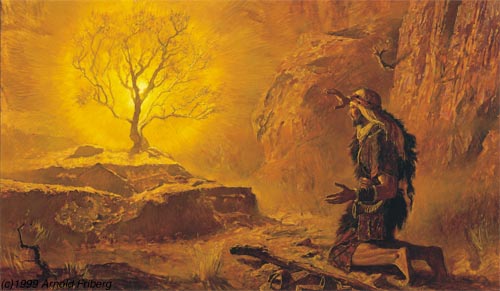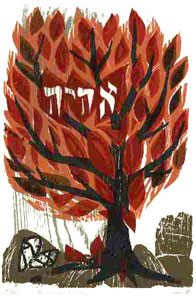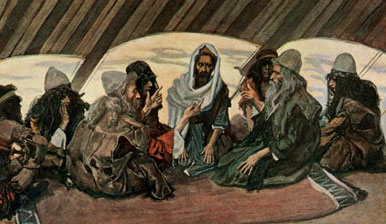
February
2008 - Vol. 16
Scripture Study and Reflection
on the Life of Moses - Part II

Moses and the Burning Bush by
Arnold Friberg
Confronting
Apathy and Complacency
with
the Burning Bush
What
Lessons Can We Learn from the Life of Moses?
By Mark F. Whitters,
Ph.D.
This the second
in a series of Scripture meditations on the life of Moses as presented
in the Book of Exodus. The struggles of Moses as savior of the children
of Israel prefigure Jesus Christ, savior of the world.
Dr. Whitters is a member
of The Servants of the Word,
an ecumenical brotherhood of men living single for the Lord. He leads the
Servants of the Word household in Detroit, Michigan, USA, which serves
urban youth and seeks to foster racial dialogue in the inner-city. He is
a lecturer in ancient history and religion at Eastern Michigan University
and a regional coordinator for a scholarly guild called the Society of
Biblical Literature. In 2005 he was selected as one of five “Regional Scholars”
by the Society.
| Background:
[see last
month's introduction]
After the story of Reuel and his
hospitality, for the first time God is directly mentioned (2:23-25). Now
the text says that God heard the groaning of the people and he remembered
his covenant. This short passage is the bridge to an epiphany between Moses
and God, which is the heart of the second story about Moses in the narrative
of Book of Exodus. All along the reader has suspected that the hand of
God was present, but at no point is there outright reference to him. |
.

The Burning Bush - print
by Jeanne Kun
|
The second story:
Exodus 2:23 - 3:6
23
In the course of those many days the king of Egypt died. And the people
of Israel groaned under their bondage, and cried out for help, and their
cry under bondage came up to God. 24 And God heard their groaning,
and God remembered his covenant with Abraham, with Isaac, and with Jacob.
25 And God saw the people of Israel, and God knew their condition.
Exodus 3:1 Now Moses was keeping the flock of his father-in-law, Jethro,
the priest of Midian; and he led his flock to the west side of the wilderness,
and came to Horeb, the mountain of God. 2 And the angel of the LORD
appeared to him in a flame of fire out of the midst of a bush; and he looked,
and lo, the bush was burning, yet it was not consumed. 3 And Moses
said, "I will turn aside and see this great sight, why the bush is not
burnt." 4 When the LORD saw that he turned aside to see, God called
to him out of the bush, "Moses, Moses!" And he said, "Here am I."
5 Then he said, "Do not come near; put off your shoes from your feet, for
the place on which you are standing is holy ground." 6 And he said,
"I am the God of your father, the God of Abraham, the God of Isaac, and
the God of Jacob." And Moses hid his face, for he was afraid to look at
God. |
What can we read between the lines
of this new information about Moses? In this tradition, he has been in
the land of Midian for quite a while, serving his father-in-law’s household
as a shepherd. (Notice the name change from Reuel to Jethro. For
the rest of the Pentateuch, this latter name will be used – another name
for this man is sometimes given as Hobab – but never again Reuel.)
Moses seems to be minding his own business, not looking for a divine revelation.
It takes a wondrous sight to catch his attention, to make him realize that
God’s hand has been upon him since his birth.
In this passage we encounter the
incarnation of God in the burning bush. The sight of the burning bush attracts
Moses, and now the plan of God involving Moses’ direct participation springs
into place. First the text acknowledges God’s concern, and
now there is the implication that Moses can respond. Before
this point Moses was merely on the receiving end of miraculous events,
but he was not really an active player in the plan of divine deliverance.
Nowhere in the Torah is there a description
of such an intense and pure divine summons. The only comparison is
Jacob encountering an angelic wrestler almost in a dream world (Genesis
32), or perhaps Elijah much later on this very mountain, hearing the divine
whisper after a theophanic storm (1 Kings 19). In the New Testament, it
is the transfiguration of Jesus himself that compares to the burning bush.
Career
and complacency
In the desert scene at the start
of Exodus 3, Moses has been wandering “to the west side of the wilderness”
(3:1): the Hebrew can also mean “behind the wilderness” (The Schocken Bible,
Everett Fox, 269n.), implying an isolated or far-off place for his shepherding
life. Like Jacob fleeing his brother’s wrath, Elijah tiring
of God’s call, or Jonah refusing to cooperate with the divine imperative,
Moses seemingly dodges the draft of God’s Egyptian plan by shepherding
sheep in Midian. He is off in another world, apparently trying to forget
his past-life experiences. Or perhaps Moses is unwittingly participating
in a divine pilgrimage.
This new account of Moses is perhaps
symbolized by Reuel’s name change: now he is Jethro. The welcome he received
from Reuel as “friend” devolves into Jethro as employer and ruler.
We can imagine that Moses has settled into a life of comfortable obscurity
and relative apathy. We get an illustration of this when Moses objects
to God’s call five times (3:11, 13; 4:1, 10, 13), even after the powerful
divine vision of the burning bush.
Moses sees the bush, and what is
remarkable is its “inextinguishability” (Fox, Schocken, 268): it burns
but is not consumed, it does not die in its energy. Now that the
Lord has Moses’ attention, he invites him to respond by worship and obedience.
Nonetheless, this prophetic call is met with less than enthusiasm, recalling
the calling of other prophets who preferred not take on the mantle of divine
choice. Moses has apparently settled into a midlife routine and does not
suffer changes and challenges willingly.
Impervious
to the burning bush, impervious to Jesus
If in the first story – see last
month’s meditation – Moses encountered God the Father in Reuel (his father-in-law
whose name means “friend”) and God the Holy Spirit in Zipporah (his wife,
whose name means “bird”), then this must be Moses’ encounter with God the
Son, the messenger of God that is incarnate – the uncreated energy of God
that comes into human sensory realms so that divine energy is released
and human history is inalterably changed. God the Son calls Moses by his
name; and then Moses, by saying “here I am,” now enters into relationship
with the living God. The burning bush shows that the inexhaustible divine
zeal is able to ignite every apathy and dullness.
Jesus cites this passage in his dispute
with the temple authorities (Matthew 22:29-32) as evidence for the eternal
relationship that God invites all humans to enter into. The Sadducees represent
the “status quo,” the conservatives of their day who were determined to
maintain the institution of the temple. By their determination to hold
on to their position in the temple, they showed their dullness to the words
of the Scriptures and their resistance to the power of God as symbolized
in the burning bush. If they would have been impervious to the burning
bush, then they would not see anything special in Jesus either. Jesus in
effect connects his own resurrection – and all humans who will be resurrected
– with the burning bush.

Jethro
and Moses - by J. Tissot
Merging of the
two stories: Exodus 4:13-26
13
But he said, "Oh, my Lord, send, I pray, some other person." 14 Then
the anger of the LORD was kindled against Moses and he said, "Is there
not Aaron, your brother, the Levite? I know that he can speak well; and
behold, he is coming out to meet you, and when he sees you he will be glad
in his heart. 15 And you shall speak to him and put the words in
his mouth; and I will be with your mouth and with his mouth, and will teach
you what you shall do. 16 He shall speak for you to the people; and
he shall be a mouth for you, and you shall be to him as God. 17 And
you shall take in your hand this rod, with which you shall do the signs."
18 Moses went back to Jethro his father-in-law and said to him, "Let me
go back, I pray, to my kinsmen in Egypt and see whether they are still
alive." And Jethro said to Moses, "Go in peace." 19 And the LORD
said to Moses in Midian, "Go back to Egypt; for all the men who were seeking
your life are dead." 20 So Moses took his wife and his sons and set
them on an ass, and went back to the land of Egypt; and in his hand Moses
took the rod of God. 21 And the LORD said to Moses, "When you go
back to Egypt, see that you do before Pharaoh all the miracles which I
have put in your power; but I will harden his heart, so that he will not
let the people go. 22 And you shall say to Pharaoh, `Thus says the
LORD, Israel is my first-born son, 23 and I say to you, "Let my son
go that he may serve me"; if you refuse to let him go, behold, I will slay
your first-born son.'" 24 At a lodging place on the way the LORD
met him and sought to kill him. 25 Then Zipporah took a flint and
cut off her son's foreskin, and touched Moses' feet with it, and said,
"Surely you are a bridegroom of blood to me!" 26 So he let him alone.
Then it was that she said, "You are a bridegroom of blood," because of
the circumcision. |
The burning bush encounter continues,
as Moses and God debate the wisdom of the plan. Moses objects that
he does not have any special powers to make people listen to him; then
he objects that he is not capable of public leadership skills. God will
only debate so much, before his anger is kindled at Moses’ objections.
The equipping of a superhero, so normal in other ancient classical stories
(e.g., Gilgamesh’s taking of the branch of the sacred tree, Odysseus’ potion
called “moly” from the underworld, Hercules and his club, Beowulf and his
sword), is almost comic here. Moses is like an anti-hero in this
episode. He wants noting to do with leaving his comfortable life
in Midian. The weapons are not much mentioned for the rest of the book,
and Aaron is not much featured as Moses’ mouthpiece. The real issue
here is whether Moses can overcome his complacency and slothfulness and
accept the divine call as prophet and deliverer.
Moses does accept God’s mission.
The words to his father-in-law (v. 18) show that he is resolved to return
to Egypt. Again note the name change (from Reuel to Jethro) which suggests
this story is separate from the earlier one about his arrival in Midian.
Moses leaves Midian like Jacob left Paddan-aram, packing up his donkeys
with wife, kids and possessions. We will see that, like Jacob, he also
has to fight a divine being along the way.
Mention of this fight returns us
to the first story of Reuel and Zipporah, who welcomed Moses and gave him
a home. But instead of a homecoming, we come now to God revealing that
Israel is metaphorically the “first-born” of the nations (vv. 22-23). Immediately
following, God seeks to kill Moses! The encounter is like Abraham
ordered to sacrifice his first-born Isaac. Both Isaac and Moses in some
sense represent the first-born sons of a future people, metaphorically
the first-born among the nations.
What is the point of all this? Both
sons are elect, and represent Israel (also elect), but God demands a blood
sacrifice for the redemption of these sons and this people. For Isaac the
demand satisfied with the blood of a ram, for Moses by the blood of his
son’s circumcision, and for Israel it will be the blood of the first-born
of the Egypt. (For Christians, it will be the blood of Jesus.)
Once the blood price has been paid,
“God let him alone” (4:26). This could be translated, “God let him
loose” or “God let him free.” The blood has been paid, and only then can
the redemption or the “glorious liberty of the sons of God” (Romans 8:21)
occur.
Questions for reflection:
-
How does the burning bush serve as a good image for Christ?
-
Has there ever been a burning bush experience in my relationship with God?
-
Do I long for God’s call and mission even when I am comfortable?
How do I fuel my longing in busy seasons of life?
-
Am I fleeing from God’s call and mission? What are my excuses?
|
|
. |
|


